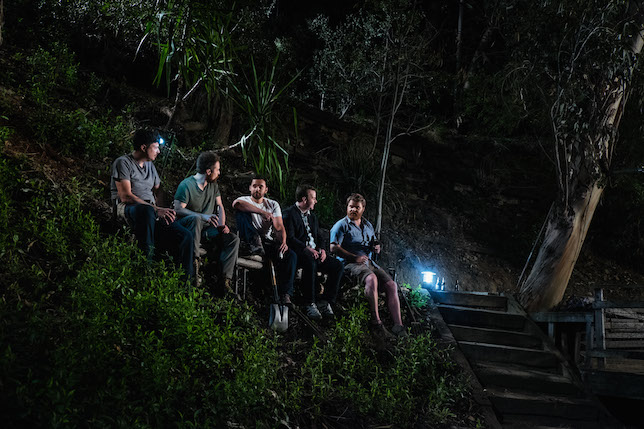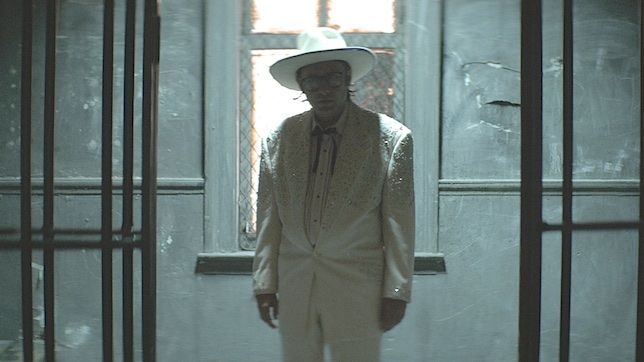CHICAGO – In anticipation of the scariest week of the year, HollywoodChicago.com launches its 2024 Movie Gifts series, which will suggest DVDs and collections for holiday giving.
2015 Sundance Diary: ‘Digging for Fire,’ ‘Entertainment’ & ‘Results’
- 2015 Sundance Diary
- 2015 Sundance Film Festival
- Anna Kendrick
- Brie Larson
- Chris Messina
- Cobie Smulders
- Digging for Fire
- Entertainment
- Gregg Turkington
- Guy Pearce
- HollywoodChicago.com Content
- Jake Johnson
- Joe Swanberg
- Kevin Corrigan
- Nick Allen
- Results
- Rick Alverson
- Sam Rockwell
- Sundance 2015 Coverage
- Sundance Film Festival
PARK CITY, Utah – There are still some films to be discussed in my Sundance coverage. Here’s write-ups of “Digging for Fire,” “Entertainment,” and “Results,” which featured the return of festival-approved directors, albeit heading in different directions.
At this year’s festival, two maestros of the ol’ mumblecore days stepped into the big-time spotlight with their new films that boasted their biggest casts and fanciest films yet. The first to show was Joe Swanberg, who has gone from super low-key directing to hosting a celebrity party this side of “This is the End” in “Digging For Fire.” The other is Andrew Bujalski, whose previous films were nerd alerts like “Mutual Appreciation” and most recently “Computer Chess.”
In a reverse course is Rick Alverson’s “Entertainment,” which doesn’t start modestly but attempt to reach a wide audience, but starts with a big promise to reach a very specific audience. An explanation on that below.
 Digging for Fire
Digging for Fire

‘Digging for Fire’
Image credit: Sundance Institute
“Digging for Fire” provides further evidence that Joe Swanberg is set to become a key American filmmaker, should he continue on the path that he is following in this film. His previous films “Drinking Buddies” and “Happy Christmas” have seen the Chicago director work with immediate star casting, but have been marred by a degree of emptiness in their expression; however honest his home-brewed tales were, they seem to be held back by their rawness.
Swanberg marries his observational aesthetic with an expressive story in “Digging for Fire,” which is essentially a marriage adventure. Married couple Tim (Jake Johnson, who also co-write with Swanberg) and Lee (Rosemarie Dewitt) are housesitting for one of Lee’s clients in Los Angeles. While exploring the grounds, Tim discovers a rusted revolver, and a single bone. This ignites his curiosity, but not Lee’s. Meanwhile, we get glimpses that the two have lost a type of adventure within themselves, lacking an exciting intimacy even when embracing each other.
The film then takes off as a riff of writer/director Katie Aselton’s “The Freebie,” in which Tim and Lee separate for the weekend as she goes to see her parents and some friends, while he stays at the house. With his wife out of the house, Tim invites a group of his buddies over, which includes partygoers played by Sam Rockwell, Mike Birbiglia, Steve Berg, Anna Kendrick, Chris Messina and Brie Larson. With Tim cutting loose most of all by continuing to dig for bones, he also witnesses the type of fun that’s become hands-off, especially when it comes to interacting with young women like the woman played by Larson.
Meanwhile, Lee is looking for something exciting. She can’t find it in proposed friend time with her two buddies played by Melanie Lynskey and Ron Livingston. She does find it in a chance encounter at a bar, where she meets a nice chef played by Orlando Bloom. In the movie’s knowing but goofy stance, just as the “younger woman” might be the stereotypical enemy of a marriage, such is the idea of a handsome guy, with an accent, who is also a ruffian (of which Bloom plays nicely, without a wink), and has a motorcycle (!)
As “Digging for Fire” moves back and forth from their tests of vows, the narrative remains casually entertaining but compelling, and finds a great energy from its acute metaphor of this dig for bones that Tim becomes obsessed with. Not only is it funny with the adventures that tempt Lee & Tim, but it is vivid in how it presents their exploratory anxieties. Aside from one kind of cheesy moment on a beach, it stays true to human interaction, which is always awkward, and never as grandiose as many relationships stories make it out to be.
“Digging for Fire” marks an exciting time for Swanberg. The movie dabbles in jokes about him selling out with his big cast, and also its setting of Los Angeles. But it shows that by making things neater, his inspiration gets across in a much deeper fashion. When Swanberg returns to Chicago, as he has claimed to Matt Pais’ RedEye that he will, this staple of modern American independent cinema will assuredly be stronger than ever.
 Entertainment
Entertainment

‘Entertainment’
Image credit: Sundance Institute
“Entertainment” is an alienated film about an alienated performer. Its story concerns isolation just as much as it is not understanding someone else, as “Entertainment” is an intangible thing the viewer is not intended to connect with. It uses the schizophrenic identity of an entertainer to show the distance between two entities — the performer to audience — and otherwise expresses itself with opaque sequences when not set on a stage.
The entertainer in question is Neil Hamburger, a vintage comedian who tells one-liners like a jilted, dirty lounge funny-man, who challenges a Don Pardo-like baritone with left-turn vulgarity. He is played by Gregg Turkington, his opposite identity. (In our world, Hamburger is a more popular comedian than is shown in this film, with viewers more engaged; consider it artistic license.) Turkington spends his days quietly shuffling through old graveyards and history tours, while at night he lathers gel on his hair, puts on a tux, and becomes the confrontational Hamburger for a bare handful of bar patrons. “Entertainment” follows Turkington as he travels southwest America, passing through different gigs while his livelihood puts him in torturous purgatory. He earns enough to make it to the next gig, but seemingly not enough to do anything else with his life.
Director Rick Alverson’s film is intentionally grating, its title with the same trickery as his 2012 unfunny project “The Comedy.” It invests all aspects of its filmmaking to challenge the entitlement of pace and clarity that a viewer may feel entitled to, even compared to the most far-out art pieces. With the story cutting back and forth between the comedian’s brilliant stand-up to him barely occupying a place in the world, “Entertainment” challenges the adage of “comedy + tragedy = time.” With this film, “tragedy + time = comedians.” Even for those who absolutely love Turkington’s legendary Neil Hamburger character, “Entertainment” is guaranteed for no one.
And yet, the magic of “Entertainment” is that its odyssey through a dually cinematic and personal hell is transfixing. One major key is its cinematography by Lorenzo Hagerman, who previously gave a cartel-torn Mexico a scarring beauty with “Heli.” Here, he contextualizes mundane oil rigs and hotel hallways with undeserved gorgeousness.
Other elements within “Entertainment” infuse for a disturbing package: Turkington’s completely defeated performance when not on stage becomes a perfect canvas only matched with the desert. An eclectic soundtrack rings with taunting contrast, and sometimes the score shrills to the teeth-gnashing of a horror film. All the while Turkington explores a very eclectic group of people, all within a nightmarish quality.
“Entertainment” has a hot-and-cold relationship with the literal. It’s one major setback involves a series of voicemails that Turkington leaves for his estranged daughter, which makes for the film’s least interesting mumblings about failure. However, the literal works to set the stage of “Entertainment” in a scene at a prison. A classic clown (played by “Joe’s” Tye Sheridan, who is destined to be a very interesting actor) pressures the audience into clapping with him, essentially telling them what to do. It’s a brilliant moment in a movie that then speaks otherwise in its own language.
Alverson’s film gets its unique flavor from its spiritual influence, that of legend Andy Kaufman. The film recalls the parts of Kaufman’s performances in which he would simply stand on stage, while the audience projects their reactionary laughs onto him. These laughs arise from pings of discomfort, confusion, amusement, etc. Each time though, a viewer’s understanding of what’s going on changes, and suddenly a man standing on stage, opposing the needs of his audience, becomes so much more than a single act. For this reason, the film’s pacing and Neil Hamburger moments should only be available to see in theaters. Seeing this in a more private format, without an audience, is not getting the joke.
That being said, it’s no coincidence that “Entertainment” is one of the finest films about entertainers since Milos Forman’s Kaufman biopic “Man on the Moon,” though this movie doesn’t categorize easily. Hamburger’s jokes/the interludes of straight comedy are too viciously low-brow and crass to fit within art-house needs, and the movie is far too spacious to the point of enjoyability’s death. Steven Soderbergh’s “Magic Mike” or Sofia Coppola’s “Somewhere” are tempting to paint a picture, but no comparison seems fair. “Entertainment” is a singular experience.
 Results
Results

‘Results’
Image credit: Sundance Institute
“Computer Chess” writer/director Andrew Bujalski returns to the Sundance Film Festival with his relationship comedy “Results,” which takes place in the world of physical trainers. The key difference is that I didn’t say the term “romantic comedy,” because this one is more about three people than one relationship. There are two trainers, Guy Pearce’s Trevor, who owns a gym, and one of his employees, Kat (Cobie Smulders). When a lonely man who has recently fallen into a ton of money named Danny (Kevin Corrigan) requests a trainer, Kat decides to take on the job. Danny is a hard person to motivate, considering his depression from a recent divorce and also his stubbornness. However, he starts connecting to Kat, even though her physical attentiveness to him is just part of her job. Though she is also lonely, she doesn’t exactly share his sentiments.
The film tempts the labeling of a love triangle when it expresses that Trevor too has feelings for Kat, but “Results” is never that simple in regards to structure. Bujalski has made a charming movie about the unexpected course of feelings, and the life narrative that charts it out. Where the film begins is excitedly well-removed from where it ends.
“Results” completes its big impression with its three performances, which are grounded yet lively. Each comes with their own amusing flaws, like Kat’s anger that is unleashed periodically, or Trevor’s naiveté that he has about his business. Even Corrigan is funny in a well-deserved lead role, flabby and charmingly self-deprecating. The stability within these performances assists in letting the narrative take off, even when Bujalski’s assembly of these moments can lead towards a confusing course of events in the third act.
The difference between “Results” and his previous “Computer Chess” is extreme, aside from the focus on their different interests. But this film proves that a change in style, and an expansion of accessibility doesn’t have to be a compromise of inspired ideas or unusual characters. “Results” a strong and very intriguing step forward for Bujalski.
 Read our 2015 Sundance coverage of ‘What Happened, Miss Simone?’, ‘The Bronze’ & ‘The Amina Profile’
Read our 2015 Sundance coverage of ‘What Happened, Miss Simone?’, ‘The Bronze’ & ‘The Amina Profile’ Read our 2015 Sundance coverage of ‘A Walk in the Woods,’ ‘Eden,’ ‘Knock Knock’ & ‘Z for Zachariah’
Read our 2015 Sundance coverage of ‘A Walk in the Woods,’ ‘Eden,’ ‘Knock Knock’ & ‘Z for Zachariah’ Read our 2015 Sundance coverage of ‘Don Verdean,’ ‘The Mask You Live In’ & ‘Me & Earl & The Dying Girl’
Read our 2015 Sundance coverage of ‘Don Verdean,’ ‘The Mask You Live In’ & ‘Me & Earl & The Dying Girl’ | By NICK ALLEN |


